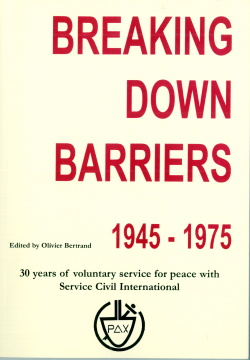Claire Bertrand (Valentin)
I have known SCI in 1959, through a friend who was going to a workcamp in Norway during her vacations. I was 22, living in Paris and studying pharmacy. Contrary to the rules according to which a previous experience in France was required, SCI agreed to my participation to this camp. At that time, I was just interested in doing something for my vacations. It was a traditional workcamp, to improve a house for handicapped people near Oslo and the sea. The work was rather hard – levelling the earth for making a playground – but the conditions were particularly pleasant: accommodation was provided by the local community, there was no cooking and the food was good.
We finished the work around five o clock and we used to go to the beach. There were around 20 volunteers, among them an Indian girl, who became a lifelong friend, a Dutchman, very young British volunteers and two Lebanese girls. We had interesting discussions, which were an opening for me. As a whole, it was holidays abroad, for two or three weeks, in a pleasant atmosphere, which fitted with my ideas and met my desire to do something useful. But I am not sure whether our work had been of much use.
When I came back to Paris, I started going to week-end camps, partly because the Lebanese volunteers had told us that they would organize a workcamp in their country the following year. I was very keen on going there and I assumed that a previous experience of work in France would be a pre-requisite to go abroad. We were renovating flats of old people (at thattime, they were the poorest group) and we completed the work, usually in one day. It was very satisfactory for the volunteers and for the old people to get such quick results. And it was an opportunity to become aware of their living conditions.
Work in the slum
But very soon, and until the Spring of 1961, I started going during the week-end to a slum near Paris (Nanterre), where an SCI team was helping Algerian and Moroccan migrant families. The war in Algeria was in full swing and the atmosphere was very tense. Monique Hervo, who was in charge of the project, was living there with another volunteer, Marie Ange Charras. She was deeply committed to the Algerian cause and in close contact with the nationalist party (which was of course forbidden). The French branch of SCI, while sympathetic to Algerian independence, did not wish to take a clear political stand, so that the work in Nanterre proceeded in a rather independent way .
Our small group was coming regularly to help Monique Hervo and Marie-Ange Charras, who were working primarily with the population and their problems with the bureaucracy. We were doing manual work to repair the barracks, especially the roofs in corrugated iron. From the point of view of the work to be performed, this was a typical SCI workcamp, but we were working only during the week end and without any international participation, however, the workcamp was international in terms of the people for whom we were working. And if the work was done between volunteers, the close relationship maintained by Monique with the people contributed to our good integration. I was seldom going with the people for their administrative affairs. It was very unpleasant, as the bureaucrats did not welcome us and we felt powerless .
I never felt that the work was too hard. I think that it was of some use and that the Algerians could not have done it, because they did not have the money to buy the materials. But what was important was the fact that we were there with them and the feeling of solidarity that there was on both sides.
The work in Nanterre was far more interesting for me than the summer camps. I felt that it corresponded better to the SCI ideology. In addition during that period I was going to various meetings where we had lots of discussions, particularly about non violence and the Algerian war. I admired the way Monique and Marie-Ange were committed and the work was for me a type of commitment with regard to the Algerian war.
During that period, I kept in touch with Valli, who was in Paris with the International Secretariat for training. When I remember it to-day, I feel ashamed to think of the conditions under which she was living: she was very isolated, apart from the presence of Dorothy, there was no comfort and no heating and she was for the first time away from her family and faced with a cultural shock, for instance due to the fact that she was a vegetarian, something unknown of at that time in France. But I felt very near to her.
During the summer of 1960, the two Lebanese volunteers met in Norway invited us to participate in a workcamp which they organized in Beit el Din, the Druze region of Lebanon. The travel was an extraordinaryexperience for me. I took a boat which called at various ports in the Mediterranean. I was sleeping on the desk, with the Greek families and their chickens. I met another volunteer, Rob Buijtenhuis, who became a lifelong friend and with whom we were shopping for our food in every port.
In Lebanon I discovered another face of the world. Until then, I was an admirer of Israel, of its socialism and its kibbutz. Now, I met volunteers (including a few girls) coming from various Arab states. They gave me a completely different version: some of them had to escape Palestine. It was a hard fact which could not suffer any discussion. It was my first contact with the Arab world. Concerning the Lebanese, it did not look so different, but I discovered very different traditions, particularly concerning the relationships between boys and girls and the pre-arranged marriages, which were often discussed. I feel now that the differences between Europe and the Middle East are even wider to-day in this respect.
Contrary to the workcamp in Norway, this one was very inefficient, since we had to build a school with an architect who was often away and with materials which arrived very late. At the end, when they arrived, we had to work very hard and quickly, under a burning sun. Nevertheless, the building was not finished. If there was little work during most of the time, we had a lot of discussions, some of them organized, others informal.
However, this workcamp was a real opening for me. I learnt a lot about the relationship with others. More generally speaking, there is no doubt that the workcamps after Norway (which was following the Western model) has been an extraordinary opening on the others and on another world – the one where I wanted to live. The spirit of SCI was in harmony with my interests at that time, for development issues and for the Algerian war. I remained faithful to this spirit, even though I hardly participated in other workcamps and had other commitments.
In 1961, I had a contract with SCI to become a long-term volunteer in India, to participate in the Kasauli project for Tibetan refugees. But I gave up because I got married (with another volunteer met in Nanterre). Nevertheless, we kept in touch with SCI when we stayed in Thailand, where we tried to start SCI activities, together with Valli, Devinder and Sato. I briefly participated in a workcamp, where we were supposed to dig a well with local volunteers recruited by the Protestant mission. The work was not very hard, but the living conditions were difficult and I don’t think that the project was successful. I also participated in week-ends with handicapped people and I was in touch at that time with SCI volunteers in Thailand.
- Monique Hervo has published several books on the period (1959-1962) spent on the slum, where thousands of pieces of corrugated iron were mixed with broken bricks. She describes the Algerian war transferred to the slum: "While the story goes on, the life of Algerian people, later on of all North Africans becomes harder and harder. Poor health conditions, narrowness and fear are always there. With the increasing horror of the war in Algeria, the climate in the slum becomes harder. In 1961, the war becomes more intense and the repression increases. The people in the slum are subject to arrests, searches and brutal raids by the police. Some men disappear".
Monique Hervo, Marie-Ange Charras, Bidonvilles, Paris, Maspero, 1971. Also: Chronique d’un bidonville, Nanterre en guerre d’Algérie, par Monique Hervo, préface de François Maspéro, éditions du Seuil, 2001 p., ". - “What was most shocking for Moniaue Hervo was possibly to know that a few yards away, there were quiet and careless French people”. MFI Hebdo, 29.11.2001.



